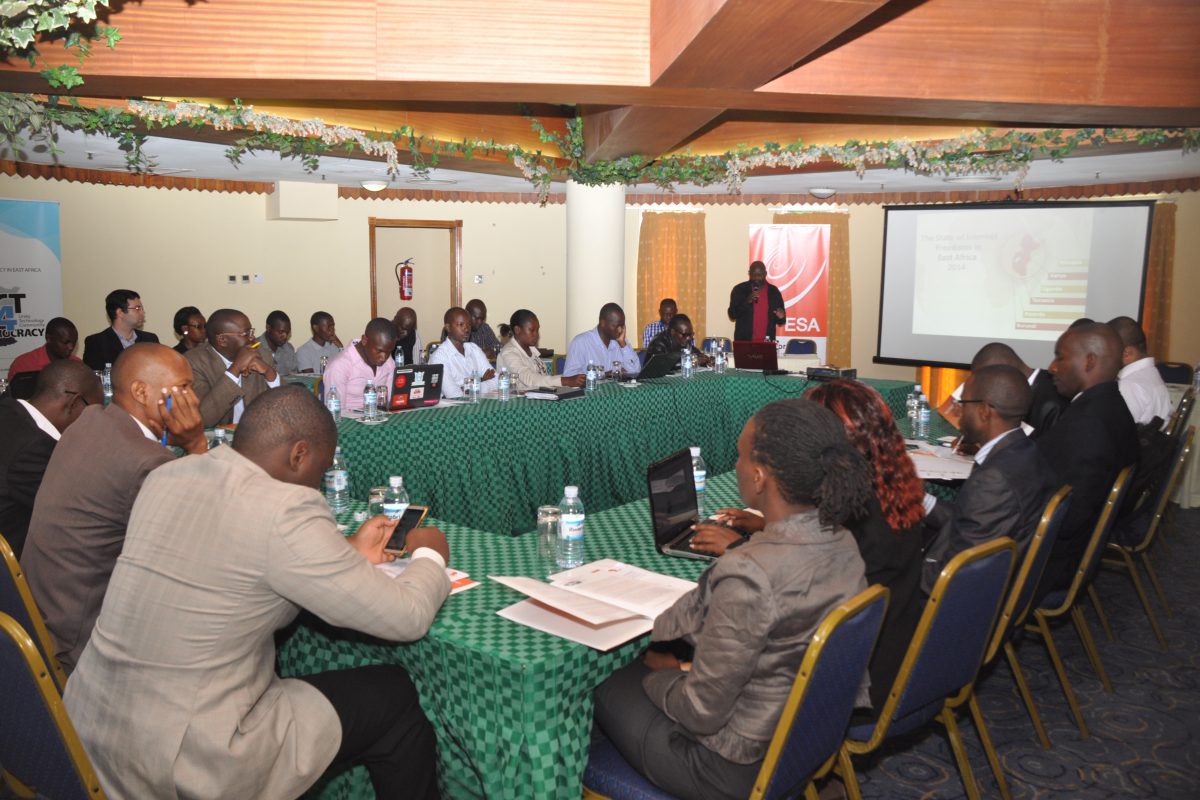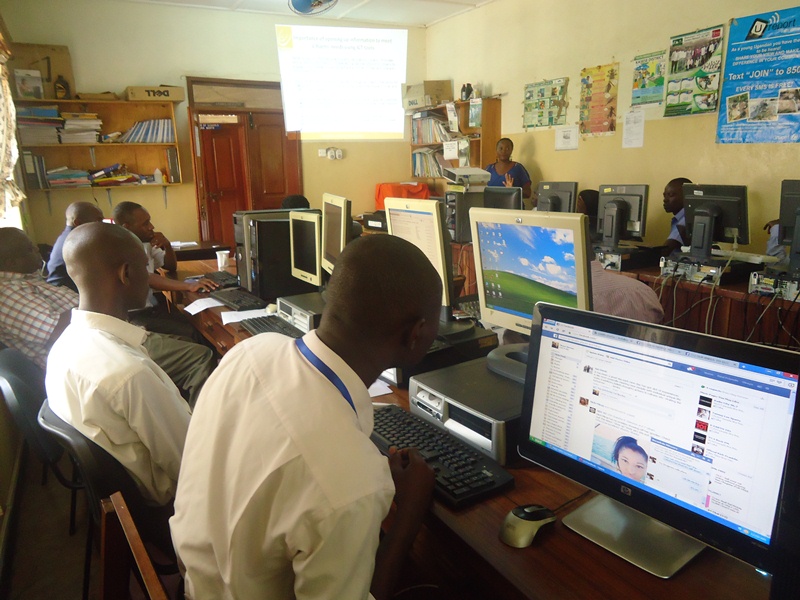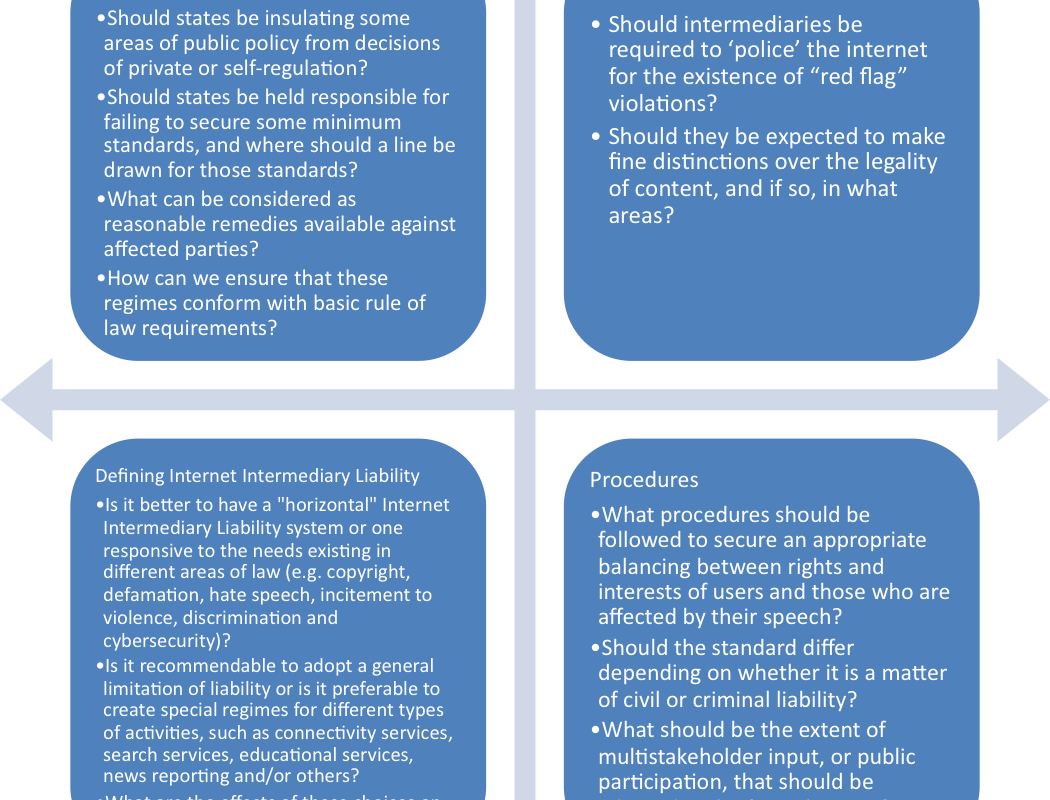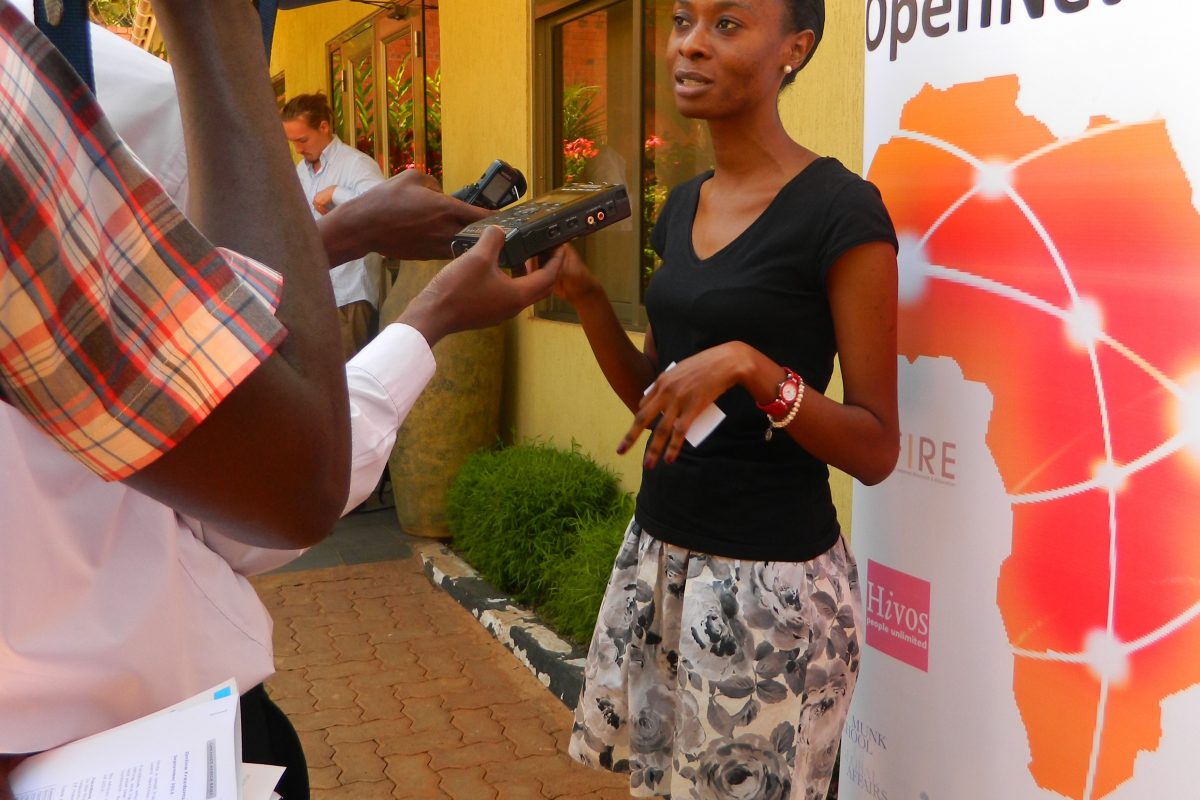By Edris Kisambira
On May 23, 2014, the Collaboration on International ICT Policy in East and Southern Africa (CIPESA) launched a report on the State of Internet Freedom in East Africa. The report is an investigation into the policies and practices that define internet freedom in the region. The event, which took place in Kampala, Uganda, was attended by ICT thought leaders, media and human rights activists from Uganda, Rwanda, Kenya, Tanzania, Burundi and Nigeria, among others.
A number of East Africa countries such as Kenya, Tanzania, Uganda and Rwanda boast over 50% teledensity and a growing number of internet users.
But as internet user numbers grow, so does content questioning governments’ democratic credentials. In turn, governments are enacting laws to counter freedom of expression, including online. These curtails are often framed under the guise of fighting terrorism, cyber crime and hate speech.
The CIPESA report noted that, regrettably, despite increased usage of the internet and infringements on freedoms, East Africans are not engaging enough in discussions around the issues of internet freedoms.
In his keynote address at the launch, the Chairperson of the ICT Committee in Uganda’s parliament, Vincent Waiswa Bagiire, noted that internet use by East African citizens has grown exponentially over the last five years. Considering the importance of the internet to improving livelihoods, the economy, and to security and stability, it had become necessary to make regulations to govern the online space.
“The issue becomes whether the rules are fair, inclusive, allow the growth of the internet and associated digital technologies, or whether they suppress citizens’ rights and creativity, lock out some sections of society and stifle creativity and innovation,” said Bagiire.
Panel discussions centred on how to find a balance between users’ freedoms and national security, as well as on online safety, security and privacy.
Arnold Mangeni, the Data Centre Manager at the National Information Technology Authority of Uganda (NITA-U) noted that when one goes online, they need not to expect security and privacy granted at the same time. He added that governments are mandated to protect citizens and as such have to curtail some freedoms while protecting citizens.
This sentiment was in sharp contrast to that of Neil Blazevic from the Pan African Human Rights Defenders Network. He encouraged citizens to take more active measures to ensure their privacy and security both offline and online. “Privacy is something we rely on in basic existence without which we face an existential crisis,” he said.
Patrick Mutahi, a Safety & Security Programme Officer from Article 19 Kenya raised the concern that while pursuing national security, governments are collecting citizen’s personal information during SIM card and national Identity registration exercises with no regulations on how this information is used. He further said governments are moving to curtail some of the freedoms because of vices like hate speech.
Lydia Namubiru, a Programme Officer at the African Centre for Media Excellence (ACME), said privacy and security online, like transport infrastructure for example, was a public service and should be guaranteed by governments. She said government surveillance online is akin to “placing a police officer at someone’s bedroom window”.
Panelists pointed to a need for competent judicial authorities to provide oversight over surveillance and monitoring. They also called for governments to consult citizens in enacting laws related to internet freedoms.
It was also pointed out that individuals and the private sector should take responsibility for their own online privacy and security.
“The Police alone cannot protect everyone online. The private sector has got to play a major role too. For example the problem of unsolicited SMS messages and online fraud where people lose millions of shillings in bogus transactions,” said Jimmy Haguma, the Acting Commissioner for Electronic and Counter Measures, Uganda Police Force.
He was backed by legislator Bagiire who said online safety is complex and needs continuous stakeholder collaborative efforts and user sensitisation efforts.
“Whereas government will put in place laws to protect users like the Computer Misuse Act and the e-signatures Ac, we the individuals have to be careful online,” he said.
Conducted between January 2010 and April 2014, CIPESA’s research found that the state of internet freedom in East Africa is littered with legislation and state actions which contradict constitutional rights provisions.
The legacy of colonial laws still lingers in countries like Tanzania and Uganda where public information disclosure is severely restricted. Besides, some laws, without being explicit on the internet and related technologies, are used in contexts that they were not intended for. Meanwhile, in Kenya, Rwanda and Burundi, hate speech content regulations posed a threat to internet freedoms. In Ethiopia, the state monopoly over telecommunications was found to enable mass surveillance and content filtering, particularly that of the regime’s critics.
The full report can be found here.
Local leaders in Kasese District Trained in e-Governance
This month, the Collaboration on International ICT Policy in East and Southern Africa (CIPESA) and the E-Society Resource Centre Kasese trained local leaders in Kasese district in the use of ICTs for improved governance and service delivery. During the March 20-21 2014 workshop, local leaders of the western Uganda district were also trained in using ICTs for information sharing and promoting citizen participation.
Speaking at the workshop, District Information Officer John Thawite urged local leaders to break away from the culture of secrecy and work in accordance with the 2005 Uganda Access to Information Act. “Meaningful participation in democratic processes requires informed participants hence the need for increased access to information,” he said.
However, Mr. Thawite noted some challenges to better access to information: poor facilitation for information officers, lack of ICT tools to process information requests, the Official Secrets Act of 1964 which bars public servants from releasing certain information, and poor coordination of information systems between departments.
During introductory sessions, participants were introduced to the basic elements of computer use, the internet and information security. Later, they were introduced to the concept of e-governance and its role in improving service delivery. The training included an interaction with the district e-government tools such as the district portal (www.kasese.go.ug), district discussion group (https://dgroups.org/iicd/kasese), E-library for district e-resources (https://elibrary.kasese.go.ug) and the district news portal (https://kasesenews.blogspot.com/).
The workshop also sought to enhance the leaders’ capability to engage with citizens through social media, and illustrated how this engagement could contribute to improved services delivery. According to Alexa.com, Facebook, Twitter, blog post and youtube are among the top ten accessed websites in Uganda and their potential in catalysing citizen participation in governance was emphasised.
Leaders were further encouraged to use the Rwenzururu facebook group (https://www.facebook.com/groups/nokasesesplit/) created in 2012 by community members in Kasese during a CIPESA citizen journalism training to discuss prevailing issues in the region..
Participants welcomed the training with one saying that he would henceforth be able to get access more information about various operations of the government through the various e-governance platforms shared. Another participant asked the e-society Resource Centre to work with heads of departments so that they always send their budgets, minutes of meetings, work plans and other communication to the e-platforms.
CIPESA has since 2011 spearheaded the iParticipate Uganda project. Through grassroots based ICT access centres in Eastern, Western and Northern Uganda, CIPESA creates awareness and builds the capacity and skills of citizens, media and local government to leverage ICTs to catalyse civic participation, democracy monitoring and access to information in Uganda. The E-society Resource Center Kasese is CIPESA’s western region partner. The centre provides support, promotes ICT literacy and the use of ICT for transparency in the Kasese local government.
Article complied by Mr. Samuel Mumbere – E-Society Resource Centre Kasese and Ms. Lillian Nalwoga – CIPESA
Towards an African Declaration on Internet Rights
As internet usage continues to grow in Africa, so does the interest by governments to monitor users’ online activities. This has led to a clash between internet rights promoters and governments in some African countries.
On February 12–13, 2014, participants from several African civil society organisations involved in promoting human rights and internet rights convened in Johannesburg, South Africa to draft an African Declaration on Internet Rights and Freedoms. The meeting was organised by the Association for Progressive Communications (APC) and Global Partners Digital in collaboration with the Media Rights Agenda, Media Foundation for West Africa and the Kenya Human Rights Commission.
Many countries justify their tough stance on internet freedom as necessary to fight cybercrime, promote peace and maintain national security. Whereas some of these policies and practices have been adopted by authoritarian regimes to retain power, others were in response to national crisis contexts such as hate speech and terrorism. Ultimately, the measures have often had chilling effects on access to information, freedom of expression, privacy and data protection.
Participants in this meeting called for the promotion of an open, free and accessible internet. Issues identified as the most crucial and still hindering internet growth in Africa that need immediate action were: improving access to internet including the development and promotion of localised multi-lingual content; addressing internet infrastructure obstacles; capacity building for users; and the need to create a balance between freedom of expression and privacy of users.
Others identified were data protection, addressing gender inequalities and gender-based violence against women online, and adopting supportive ICT policies that promote freedom of expression online and equitable access to information.
Due to increased internet freedom violation incidents coupled with regressive policies being made in many countries, the need for a well-defined Internet Intermediary Liability (ILL) regime has also become increasingly apparent. Another meeting held on February 10-11, 2014 organised by the APC with support from Google Africa discussed the responsibility that may be placed on intermediaries in implementing monitoring and control mechanisms laid down by the laws.
At the regional level, there are legal and regulatory frameworks like the Africa Charter on Declaration of Principles on Freedom of Expression in Africa, which provide limited protection for internet rights and the liability of internet intermediaries. It was noted that such frameworks could act as building blocks for individual countries to draw up best practices on ILL regimes.
There was consensus that such existing frameworks should be the basis for adopting a general guide with definitions of terms on Internet intermediary liability. This guide would act as central referencing document on which individual countries would base their national IIL regimes.
During the discussions, participants charted their thoughts on a best practice guide for an IIL regime for Africa by asking the below questions:

While responding to these questions, participants recognised that intermediaries can play a crucial role in promoting Internet freedoms in Africa.
Meanwhile, the meeting also reviewed recent policy and practice developments in Uganda, Kenya, South Africa and Nigeria since the 2011 Intermediary Liability in Africa research. It identified a need to increase awareness among different stakeholder groups of the importance of clear regulatory frameworks for intermediary liability to secure rights on the internet; and for stronger collaboration to advocate for best practice internet intermediary regulatory measures in Africa.
The outcomes of both these meetings will form the basis for the draft civil society Africa Declaration on Internet Rights and Freedoms, which will be launched at the ninth global Internet Governance Forum (IGF) in Istanbul, Turkey September 2-5, 2014. The declaration will be available for public input throughout the period leading up to IGF 2014.
Internet Rights in Uganda: Challenges and Prospects Workshop Report
The Collaboration on International ICT Policy in East and Southern Africa (CIPESA, www.cipesa.org) in conjunction with Unwanted Witness Uganda (www.unwantedwitness.or.ug) on November 28, 2013 organised a workshop on promoting internet rights in Uganda. The workshop aimed to create awareness among civil society, netizens, and the media in Uganda on how policy and practice affect internet freedoms in the country. The workshop also sought to draw up strategies for network building and advocacy to promote and protect online freedoms in Uganda.
Download the workshop report here.
CIPESA, Partners to Host Uganda Internet Governance Forum 2013
The Collaboration on International ICT Policy in East and Southern Africa (CIPESA) in partnership with the Internet Society Chapter Uganda and the ICT Association of Uganda (ICTAU) will host the Uganda Internet Governance Forum (UIGF) at the Hive Colab, Kamyokya on September 18, 2013.
The one-day Forum, whose theme is “Harnessing Internet Development in Uganda: Connecting the last mile”, is a multi-stakeholder event that involves representatives from government, civil society, academia, private sector entities and individuals interested in Internet Governance (IG) issues.
The objectives of this Forum are to discuss obstacles to internet access in Uganda, establish the key current internet governance issues relevant to the country, and build consensus on national and regional positions around IG issues. The national forum will also discuss the outcomes from the regional East Africa Internet Governance Forum held in Burundi last month.
Since its inauguration in 2006, the UIGF has continued to discuss and address internet policy issues in Uganda and East Africa. The proceedings of this year’s Forum will also be presented at the Second African Internet Governance Forum to be held in Nairobi September 24-26, 2013 and the global Internet Governance Forum in Bali, Indonesia October 22-25, 2013.
Tentative Programme
| Time | Activity | Speaker/moderator |
| 08:00am – 08:30am | Arrival and registration of participants | ISOC Uganda |
| 08:30am – 08.45am | Welcome Remarks | Lillian Nalwoga |
| 08:45am – 09:00am | Keynote Address | Dr. David Turahi, Director for Information Technology and Information Management Services – Ministry of ICT] |
| 09:00am – 09:30am | Presentation: Online discussions report | Daniel Nanghaka (ISOC Uganda) |
| 09:30am – 10:00am | Q&A session | Sarah Kiden (ISOC Uganda) |
| 10:00 am – 10:15am |
Morning break |
|
| 10:15am – 11:15am | Panel discussion (15 mins each): – Achieving affordable internet access in Uganda – infrastructure and affordability; what have we achieved so far and how can we utilise the existing infrastructure | Mr. Bob Lyazi, Director RCDF – UCC (TBD)Mr. Mike Barnard, Director – Uganda Internet Exchange Point (UIXP)Mr. Julius Torach, Director of egovernment, NITA – UJoseph Munuulo, Systems Administrator – Uganda Registration Services Bureau. Hari Kurup – Roke Telecom |
| 11:15 am – 11:45am | Q&A session and discussion | Sarah Kiden |
| 11:45am – 12:45pm | Panel Discussion (15 mins each): Online freedoms – Privacy, data protection, surveillance and censorship: what needs to be balanced? | Mr. Peter Kahiigi, Director Information Security – NITA – UMs. Ashnah Kalemera, OpenNet Africa Initiative.Mr. Peter G. Mwesige, Director Africa Center for Media Excellence. |
| 12:45pm – 01:15pm | Q&A session and discussion | Mr. Albert Mucunguzi – ICTAU |
| 01:15pm – 02:00pm |
Way forward, closure and Lunch |
Lillian Nalwoga |
See past reports from the Uganda IGF here: 2011 Forum Report, 2011 Online Discussions and 2012 Forum Report.
See past reports from the East Africa IGF here:





